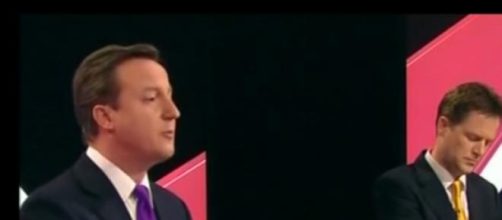A consortium that includes the Guardian, the Telegraph and YouTube is offering an online platform for a debate between the five main party leaders, David Cameron, Ed Milliband, Nigel Farage, Natalie Bennett and Nicola Sturgeon, in the run-up to the general election. While the date originally proposed was March 30th, the consortium has now offered to schedule it for the 26th or 27th in order to accommodate David Cameron’s request that it be held before the ‘short campaign’ begins when parliament dissolves around the 30th.
At the No. 10 lobby briefing on Wednesday, the Prime Minister’s spokesman indicated that Cameron is considering this offer, which is more than can be said for his engagement with the leaders' debates that have been proposed for broadcasting on the BBC, ITV, Channel 4 and Sky News. Beset with difficulties, the negotiations between broadcasters and politicians over the televised debates are now at an impasse. The broadcasters have offered a schedule of three debates, the first two to include seven party leaders, and the last between Cameron and Milliband, to be held throughout April. Cameron, meanwhile, has stipulated that he will only engage in one debate,There are of course problems with the whole notion of leaders’ debates in the UK since unlike in the US the public votes for an entire party, not just its country’s leader.
There have also been problems with the way in which the television broadcasters have set up the leaders’ debates, mainly around impartiality in their design. However, David Cameron’s objections to debating have been delivered in a fragmented manner, on the back of each solution that broadcasters have offered. Rather than contributing to a constructive discussion on how to incorporate fairness and impartiality into the debates, he has obstructed and delayed as the months have worn on, which suggests a specific disinclination to join the debates at all. The broadcasting group, it would seem, has grown weary of what look suspiciously like stalling tactics.
There could be several explanations for this apparent reluctance, not least of which being that Ed Milliband will be able to present himself to the public without being filtered through an often negative media, or within the Tory-controlled narrative of his questionable economic competence and leadership ability.
No doubt David Cameron will also be weighing the political cost of appearing afraid to debate Ed Milliband against that of the risk of losing the debates. Whatever his calculations, however, his actions only serve to reveal a politician who prefers to keep a tight hold on public perception of both his party and the party of the opposition. This is no more democratic than the bias he routinely accuses the broadcasters of exhibiting. If he does consent to the proposed online debates in the end, perhaps we might be able to believe that Cameron does, after all, value the democratic process as much as his own place within it.

